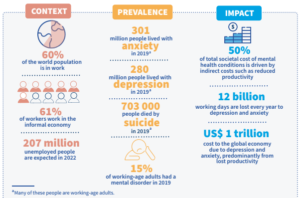Introduction
According to WHO, mental health is a crucial and necessary part of healthy living. This can only be achieved when a person is in a state of physical, mental, and social well-being and not just the absence of sickness or infirmity.[1] This definition, therefore, gives an insight into how mental health is crucial to a person’s ability to work, think, emote, interact and enjoy life. It is therefore important that the promotion, protection and restoration of mental health should be regarded as an important area of health of individuals, communities and society at large. There is a close synergy between work and mental health. A safe and healthy workplace promotes mental health, and workers who are in excellent mental health may perform well.[2] Mental health may however be harmed by a dangerous or unhealthy workplace, and if left untreated, poor mental health can impair one’s capacity to work.[3]

Figure 1: WHO 2022, Mental Health at Work: Policy Brief.
What is the Problem?
More than 60% of the world’s population is at work.[4] In Nigeria, the employment rate stands at 67%[5] and a report from the Nigeria Bureau of Statistics estimated that out of 46.5 million who are currently employed, 30.6 million are in full-time employment.[6] The working population in Nigeria is relatively very young, with the majority within the age bracket of 25-44 years.[7] Furthermore, recent data estimates that 20%-30% of the Nigerian population suffers from one mental disorder or the other.[8] This indicates that the working population may be affected by one mental health condition or another.
Many factors contribute to the prevalence of mental health conditions in Nigeria. They include poor socio-economic conditions, underfunding of mental health services, brain drain syndrome in Nigeria’s public healthcare sector, and the inability to review the already outdated “Lunacy Act, 1958”[9] that still regulates mental health in major respects. It is important to note that the working population in Nigeria are also not exempted from these risk factors that can predispose to the development of mental health conditions. Other risk factors that contribute to poor mental health in the workplace, especially in Nigeria also include but not limited to workplace pressure and poor remuneration.
Way Forward
It is evident that the average worker in Nigeria is exposed to situations that may impair mental health both within the workplace and the society at large. Addressing the issue of mental health in the workplace will provide an avenue to reduce the menace of mental health challenges in the workplace and the country at large. One of the ways to drive a healthy work environment which will have the right impact on mental health is through policy development. Although Nigeria had developed a National Policy for Mental Health Services Delivery[10], its implementation is relatively poor and this is visible in the high prevalence of mental health conditions in the country.[11] In order to address these challenges, developing a policy on mental health in the workplace will go a long way in preventing and reducing its occurrence in the country.
Policy Recommendation
- Government and organizations should review existing and develop new employment,
OSH laws, policies and guidance to include provisions on mental health as it does for physical health - It is also recommended that the definition of occupational health should cover both physical and mental health. This will also require including mental disorders as occupational diseases of significant importance. This will be in line with the ILO list of occupational diseases.[12]
- It is also important to ensure that workers are employed in spaces where they can function within their physical and mental limits or ensure they are transferred to alternative suitable roles without any loss of pay or seniority.
- Ensure that the rights, employment and income of workers affected by mental conditions are protected.
- Engage workers to identify psychosocial hazards and provide actions to mitigate the associated risks or hazards at work
REFERENCES
[1] https://www.who.int/news-room/fact-sheets/detail/mental-health-strengthening-our-response
[2] WHO 2022, Mental Health at Work: Policy Brief.
[3] ibid
[4] ibid
[5] https://tradingeconomics.com/nigeria/employment-rate
[6] https://punchng.com/workers-in-formal-sector-earn-n159tn-in-four-years-nbs
[7] https://kairoscapitalng.com/wp-content/uploads/2021/03/Unemployment-Rate-Q4-2020.pdf
[8] ibid
[9] Westbrook AH (2011). Mental health legislation and involuntary commitment in Nigeria: A call for reform.
[10]https://www.healthnews.ng/wpcontent/uploads/2018/07/national_policy_for_mental_health_service_delivery.pdf
[11] ibid
[12] WHO 2022, Mental Health at Work: Policy Brief.








